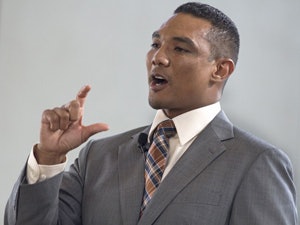LOS ANGELES — The African American Male Education Network and Development organization (A2MEND) conference marked its 10th anniversary last week by attracting more than 1,000 attendees and more than doubling the total amount of scholarship money awarded last year.
 Dr. Dyrell Foster
Dr. Dyrell FosterThe meeting brought together faculty, staff, students and administrators from across the country to address strategies that affect the success of African-American male community college students. This year, the summit raised $43,000 to help support 59 students in their education in community colleges as well as while transferring to four-year institutions.
A2MEND hopes to shed light on the institutional challenges and barriers for African-American males so that educational outcomes will improve and close the achievement gaps for these students.
“We are here to serve those who are underserved,” said Dr. Francisco Rodriguez, chancellor of the Los Angeles Community College District. “We need to ensure that our doors remain open. We are the Ellis Island of higher education.”
Students were also privy to contact with recruiters from several historically Black colleges and universities, including Howard University, Fisk University and Bethune-Cookman University. The college fair also had representation from the University of California, Berkeley and the University of California, San Diego among many others to look over transcripts for transfer-ready students and attendees.
A2MEND president Dr. Dyrell Foster emphasized the necessity of challenging the status quo within institutions in order to ensure the success for African-American males in community college, in their career development and academic success.
“Addressing racial and equity gaps on our nations’ campuses is critical and requires taking risks to do the right thing on behalf of our students,” Foster said. “We can no longer solve the problems that exist on our campuses with the same thinking and behaviors that have caused the problems in the first place.”
The Academic Senate of California Community Colleges (ASCCC) that works to support 57,000 community college faculty members was on hand to announce a partnership with A2MEND. South Representative and Equity and Diversity Chair Randy Beach said, “We are a professional organization that focuses on legislation and policy and are glad to be a part of an organization that provides pathways for students to further their education. We also recently launched a pathway program for community college students that have aspirations of becoming community college faculty that we hope A2MEND students utilize.”
Breakout sessions this year include first-year experience programs for first-generation students, the impact of implicit bias on African-American men, and transfer pathways to historically Black colleges and universities (HBCUs). These topics are of particular significance since, this week, President Donald Trump signed an executive order in an effort to strengthen relationships with HBCUs.
Advice to young Black men by keynote speaker Dr. Michael Eric Dyson said, “Understand the culture in which we live and then flip it your advantage. Coming from a village of freedom fighters, that freedom is important. Are you free from the impediments of barriers that are sometimes imposed on yourself? It is our responsibility to help you find out what you are good at. You have the chance to do things.”
Recently appointed A2MEND Board Member Trevor Brackett is grateful to be a part of an organization dedicated to the success of African-American males in higher education. “Being a part of this organization is much more than advocating for the success of African-American males in community colleges. It’s about a brotherhood and students can authentically visualize success when they have us as examples. For the students that attend the conference, [they] end up leaving with a better outlook on life, and we strive to transform the mind, hearts and spirits of the students we serve.
University of Illinois student and A2MEND mentee Bryant Hobbs expressed how mentoring helped him transfer to a four-year institution from a community college. “The leaders of this conference are working to build a legacy and, as mentees, we are the legacy. They want us to surpass where they are at professionally and instill in us that we can do it.”
For more information on the A2MEND organization visit a2mend.org.
Jamal Mazyck can be reached at [email protected] and on Twitter at @jmbeyond7.















